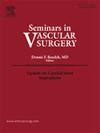Management of carotid disease in the end-stage renal disease patient
IF 2.4
3区 医学
Q1 PERIPHERAL VASCULAR DISEASE
引用次数: 0
Abstract
Chronic kidney disease (CKD) has been increasing in incidence as a result of the growing prevalence of diabetes and other risk factors for cardiovascular disease. This study highlights reports related to management of carotid disease in patients with CKD, with a special emphasis on end-stage renal disease (ESRD). Several earlier studies found that patients with CKD are more likely to die from cardiovascular causes than progress to ESRD requiring dialysis. Data derived from the US Renal Data System showed that the 30-day stroke/death rate was 10% after carotid endarterectomy and 11% after carotid artery stenting in patients on dialysis, with a median postoperative survival of 2.5 years. However, these data were representative of a patient cohort from 2005 to 2008. In the past 2 decades, significant life expectancy gains have been noted for patients with ESRD. Recent studies reported adjusted mortality has decreased by 20% in patients on hemodialysis and 29% in patients who underwent transplantation. In addition, recent studies have found that among patients with CKD, carotid endarterectomy and transcarotid artery revascularization had stroke/death rates of <2% for asymptomatic patients and <3% for symptomatic patients. Based on studies published to date, the risk of carotid intervention, whether carotid endarterectomy or stenting, specifically transcarotid artery revascularization, can be justified for carefully selected symptomatic patients with severe CKD with acceptable operative risk and good long-term life expectancy. However, patients with asymptomatic carotid disease and severe CKD, specifically ESRD, should be offered best optimal medical therapy unless life expectancy exceeds what has been recommended by recent Society for Vascular Surgery carotid guidelines.
终末期肾病患者的颈动脉疾病管理。
由于糖尿病和其他心血管疾病风险因素的发病率不断增加,慢性肾脏病(CKD)的发病率也在不断上升。本研究重点介绍了有关 CKD 患者颈动脉疾病管理的报告,特别强调了终末期肾病 (ESRD)。早期的几项研究发现,慢性肾脏病患者更有可能死于心血管疾病,而不是发展为需要透析的 ESRD。来自美国肾脏数据系统的数据显示,透析患者颈动脉内膜剥脱术后 30 天的中风/死亡率为 10%,颈动脉支架术后 30 天的中风/死亡率为 11%,术后中位生存期为 2.5 年。不过,这些数据仅代表 2005 年至 2008 年期间的患者队列。在过去的 20 年中,ESRD 患者的预期寿命显著延长。最近的研究报告显示,血液透析患者的调整后死亡率下降了 20%,接受移植手术的患者的调整后死亡率下降了 29%。此外,最近的研究发现,在慢性肾脏病患者中,颈动脉内膜剥脱术和经颈动脉血运重建术的中风/死亡率为
本文章由计算机程序翻译,如有差异,请以英文原文为准。
求助全文
约1分钟内获得全文
求助全文
来源期刊
CiteScore
3.50
自引率
4.00%
发文量
54
审稿时长
50 days
期刊介绍:
Each issue of Seminars in Vascular Surgery examines the latest thinking on a particular clinical problem and features new diagnostic and operative techniques. The journal allows practitioners to expand their capabilities and to keep pace with the most rapidly evolving areas of surgery.

 求助内容:
求助内容: 应助结果提醒方式:
应助结果提醒方式:


